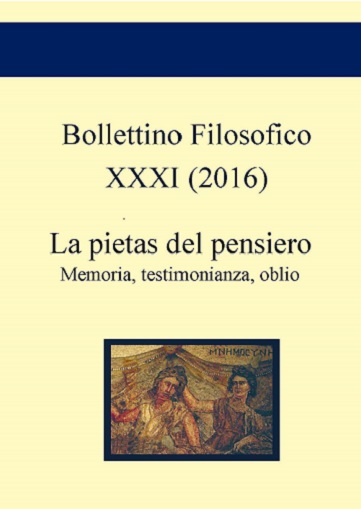Custodire la memoria, contrastare l’oblio. L’eccesso del male e la problematicità del perdono
Abstract
This philosophical essay considers the themes of memory and oblivion from a concrete situation: the experience of World War II and Nazism. On the one hand, we need to remember those events, in particular the Shoah, and that means preserve its memory; on the other, it is necessary to counteract the oblivion of those moments. Of course, preserve the memory and fight oblivion are two sides of the same coin. The author traces a path that starts from a personal memory, a visit to Auschwitz, through and interrogating the history of philosophy around the theme of memory, from Plato to Ricoeur, until the most current theoretical considerations, such as the reflection on the European Union. It must be remembered that EU is born from the ashes of Auschwitz, in an attempt to make it impossible that an event like this could happen again. Forget the origin of European Union and desire its end, it means running the risk that Auschwitz could happen again.Downloads
Bollettino Filosofico pubblica in internet, ad accesso aperto, con licenza:
|
|
CCPL Creative Commons Attribution |
L'autore conserva il copyright sul suo contributo, consentendo tuttavia a chiunque "di riprodurre, distribuire, comunicare al pubblico, esporre in pubblico, rappresentare, eseguire e recitare l'opera", purché siano correttamente citati l'autore e il titolo della rivista. L’autore, al momento della proposta di pubblicazione, è inoltre tenuto a dichiarare che il contenuto e l’organizzazione dell’opera è originale e non compromette in alcun modo i diritti di terzi, né gli obblighi connessi alla salvaguardia di diritti morali ed economici di altri autori o di altri aventi diritto, sia per testi, immagini, foto, tabelle, sia per altre parti di cui il contributo può essere composto. L’autore dichiara altresì di essere a conoscenza delle sanzioni previste dal codice penale e dalle leggi speciali per l’ipotesi di falsità in atti ed uso di atti falsi, e che pertanto Bollettino Filosofico è esente da qualsiasi responsabilità di qualsivoglia natura, civile, amministrativa o penale, e sarà dall'autore tenuta indenne da qualsiasi richiesta o rivendicazione da parte di terzi.
